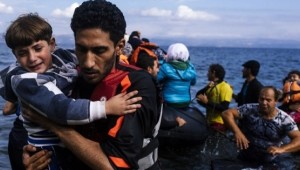Children facing greater risks in refugee crisis
Ten times as many migrants and refugees arrived in Europe by sea in the first six weeks of the year as in the same period of 2015, and alarmingly a third of them were children, aid agencies have reported.
Tragically, the number of deaths has also soared. The number of arrivals topped 80,000, and the number of deaths shot up to 409 on Mediterranean routes from 69 in the first six weeks of 2015, the International Organization for Migration (IOM) has said.

More and more children are facing life as refugees in the European crisis
UNICEF reports more than one third of migrants making the treacherous sea crossing to Greece from Turkey are now children – a sharp rise from as recently as six months ago, the UN agency said, when 73 per cent of the migration flow was male, and only one in 10 migrants was an accompanied child. Now most are women and children.
“The implications of this surge in the proportion of children and women on the move are enormous – it means more are at risk at sea, especially now in the winter, and more need protection on land,” UNICEF’s special coordinator for the refugee and migrant crisis in Europe, Marie-Pierre Poirier, said.
The IOM has said it expects no decline in the number of arrivals in Europe and it predicts that next month Greece would receive its 1 millionth arrival since the migrant crisis began.
More than 1.1 million people fleeing poverty, war and repression in the Middle East, Asia and Africa reached Europe’s shores last year, most of them heading for Germany.
Around half the arrivals are refugees from the Syrian war, the United Nations High Commission for Refugees (UNHCR) said.
The IOM reported that 70,365 migrants and refugees had arrived by sea in Greece so far this year, and 5,898 in Italy.
Some 319 have died while crossing the eastern Mediterranean from Turkey to Greece and 90 on the central route between North Africa and Italy.
“There are more concurrent crises around than we’ve ever seen at one time,” an IOM spokesman said.
“Conditions on the ground in the countries that are feeding the migrant crisis are largely unchanged, so we think the numbers will probably stay the same,” he said.
The number of arrivals in Greece by sea has fallen in February due to bad weather.
According to Greek police, some 44 per cent of January arrivals were Syrian, 27 per cent Afghan, and 17 per cent Iraqi.
All three nationalities have been allowed to leave Greece and enter the Former Yugoslav Republic of Macedonia (FYRoM) on route to Western Europe.
The remaining 12 per cent included large numbers of Pakistanis and Iranians. Some 44 per cent of the arrivals were men, 22 per cent women and 34 per cent children.
As many as 10,000 unaccompanied children who have travelled to Europe may be unaccounted for, according to a report from the EU’s police agency Europol.
The agency warned that children were at greater risk of abuse and exploitation at the hands of people smugglers.
UNICEF called on the international community to make protection of women and children migrants a priority, and said the best interests of each individual unaccompanied child should be examined before taking any action.
“Welfare, protection and health systems need to be strengthened at every step of the way so that children and women are not exploited or fall between the cracks,” Ms Poirier said.
Laurie Nowell
AMES Australia Senior Journalist












